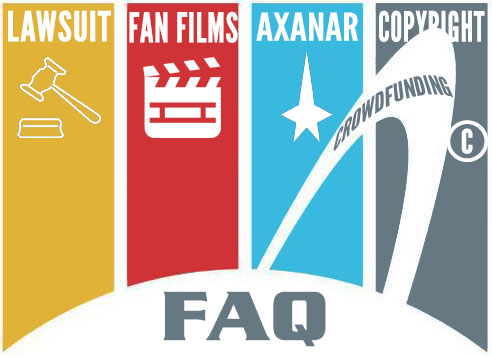This is an old revision of the document!
Frequently Asked Questions
LAWSUIT PRIMER Get an overview of the copyright lawsuit, including a timeline of the case, as well as downloadable pleadings made by the plaintiffs, CBS and Paramount, and defendants Alec Peters and Axanar Productions Inc. » Lawsuit Primer
Here are the most frequently asked questions asked about the Axanar copyright lawsuit, with answers as documented in AxaMonitor. Please submit new questions. You can use the Send Feedback link in the lefthand navigation bar on any AxaMonitor page.
Lawsuit
- Why is Axanar getting sued?
- Basically, CBS and Paramount allege Axanar is illegally using their Star Trek copyrights for their own direct financial benefit. You can read a full summary of their reasons in this summary of the lawsuit.
- Is the lawsuit really "going away"?
-
Major news media proclaimed the suit was to be “dropped” following the unexpected announcement on May 20, 2016, by producer J.J. Abrams. What he actually said was that the suit was “going away” within a few weeks. CBS and Paramount’s jointly stated only that they were in settlement talks with Axanar, which was true even before Abrams’ announcement.
Things got more complicated when Axanar filed its response to the lawsuit in federal court three days later, which included a counterclaim — essentially filing suit against CBS and Paramount. The counterclaim starts its own ticking clock under the court’s control, not the plaintiffs’, meaning CBS and Paramount can’t unilaterally withdraw the suit until the counterclaim is dealt with. In the meantime, the case proceeds as it normally would, either eventually reaching trial or being settled out of court.
- Isn't this really about 'Axanar' competing with 'Star Trek Beyond' during the 50th Anniversary?
-
This is a claim made by Axanar producer Alec Peters, a defendant in the case. However, to date no one has offered any concrete evidence this is so. Intellectual property attorney Mary Ellen Tomazic asserts that Axanar’s alleged commercial exploitation — unique from the activities of other fan productions — of Star Trek copyrights appears sufficient cause for CBS and Paramount to bring suit against the production.
- Inquisitr speculates on the competition theory
-
In January 2016, AxaMonitor published a link to this Inquistr article elaborating on this same theory, also without concrete evidence:
 CAN AXANAR and ‘Beyond’ co-exist? Inquisitr wonders whether Axanar could derail Paramount’s official franchise reboot, and speculates the coexistence of these two films is likely to polarize the fan base in a way that taxes Paramount’s pockets. From Inquistr.
CAN AXANAR and ‘Beyond’ co-exist? Inquisitr wonders whether Axanar could derail Paramount’s official franchise reboot, and speculates the coexistence of these two films is likely to polarize the fan base in a way that taxes Paramount’s pockets. From Inquistr.
- 'Plagiarism Today' supports the theory
-
For Plagiarism Today, Jonathan Bailey speculates:While it’s unclear why Paramount and CBS tolerated both the original Axanar short and the Star Trek Continues webseries, it’s likely that they felt the [Axanar feature] film might have detracted from or cannibalized the ongoing series films being produced under the Star Trek banner.1)
- Why are CBS and Paramount suing Axanar and not other fan films?
-
Because of the lawsuit, on April 20, 2016, CBS advised the producer of the sequel to Star Trek–Horizon to cancel its planned $250,000 crowdfunding campaign. Other fan productions have been contacted by CBS about curtailing — but not shutting down — their activities; none of them are being sued, however. This is a developing story.
None of the other productions are parties to this or any other copyright suit brought by CBS and Paramount. The only avenue of inquiry currently available are the reasons outlined in just the Axanar lawsuit.
If you accept Axanar supporters’ argument that other fan productions also infringe yet have had no legal action taken against them, then what are the remaining reasons that apply only to Axanar?
Of the suit’s causes of action, only two elements arguably are unique to Axanar: That “the defendants enjoy a direct financial benefit,”2) and that they believe they are entitled to “create, distribute, market, advertise, promote, sell or offer for sale derivative Star Trek works.3)
Those two causes have in common one thing: commercial exploitation of Star Trek’s copyrights that have generated more than $1 million for Axanar — the most money raised by any fan production.
- Axanar isn't selling copies of the movie. Why is CBS suing them?
- Under U.S. copyright law, CBS doesn’t have to prove any kind of profit to show that Axanar infringed on its copyrights. According to intellectual property attorney Mary Ellen Tomazic, CBS has tolerated the use of its copyrights by most fan productions, informally telling them that they can’t exploit Star Trek commercially. Generally, that means ‘don’t sell the film,’ but commercial exploitation can go beyond that. Axanar’s full line of merchandise and the commercial studio it was building may have caught the copyright holders’ attention.
- Can someone go to jail for this?
- While copyright infringement is technically a criminal offense, it is rarely prosecuted as such. This case is a civil lawsuit, meaning that producer Alec Peters, Axanar Productions and any co-defendants are liable only for monetary damages and the plaintiffs’ legal costs if the defendants lose at trial.
- Who are the 20 unnamed defendants?
-
We don’t know yet, but we may soon. We know some things about whom they might be, like writers, directors, producers, costume and set designers and others, and what kind of legal trouble they may be in if they’re named in the case.
Fan Films
- Why won't Star Trek allow fan films the way Star Wars does?
- Apart from a formal contest with highly restrictive rules (including a five-minute time limit and limited use of pre-authorized sound effects),4) most Star Wars fan films exist in the same legal gray area of “tolerated use” as do Star Trek fan productions.
- Why doesn't CBS simply give fan films clear rules about what they can and can't do?
-
Clear rules could actually cause legal problems for CBS, which, like many copyright holders, is unwilling to cede control over their own property.
Writing in Plagiarism Today, Jonathan Bailey says the simple solution would seem to be “rigid rules for fan creations, to basically create guidelines that would ensure fans were safe,” but that’s unlikely to happen. “It’s impossible to predict exactly how fans will use the original work and it’s very possible for a fan creation to comply with with the letter of the law but still be undesirable or even harmful to the original creation. … Rightsholders want flexibility when it comes to dealing with fan creations and, with that flexibility, comes uncertainty. We’re not likely to see many rightsholders laying down hard rules, save in specific areas, and that is going to create a great deal more fan/creator conflicts in the near future.”5)
- Don't other fan films pay people, too?
- Fan films are largely run by volunteers. Yes, some do pay union actors and people who provide other services not otherwise available from volunteers, but they do not use crowdfunding to pay salaries to the producers themselves.
- Why is paying producers such a bad thing?
- Copyright holders often tolerate fan films but have drawn the line where their intellectual property is being commercially exploited. One sign of that is what the lawsuit calls “direct financial benefit,” which may include merchandise sales and salaries taken by the films’ producers.
- 'Star Trek Continues' also crowdfunds a studio; why aren't you criticizing them?
- Other fan productions’ studios are single-purpose — with standing sets used only for making their own films. Axanar’s sets are not standing; according to their annual report, they’re expressly designed to be easily disassembled so Axanar can earn money from the studio: “At Axanar, we are building a fully-functioning sound stage that we will also be able to rent out to support the production and the studio. That means no standing sets.”6)
Axanar
- Axanar says they're totally non-profit.
-
Axanar Productions, Inc., is a registered for-profit corporation in the state of California. You can look it up yourself here.
While its Star Trek films Prelude to Axanar and Axanar will have been made available for free, Axanar Productions is alleged by CBS and Paramount to have commercially exploited Star Trek copyrights for Axanar’s “direct financial benefit” through such means as merchandising and salaries for producers and other staff.7)
- Did Axanar producer Alec Peters really pay himself a salary?
-
Yes. According to the spending report in the Axanar Annual Report 2015, Revised, Alec Peters and other Axanar Productions staff were paid salaries. Peters’ annual salary totaled $38,166.57, plus payment of his $3,099 dues to the actors’ union, SAG-AFTRA.8)
All told, Axanar paid out $118,428.88 in salaries from the money raised in its second Kickstarter campaign.9)
- Is actor Tony Todd still in 'Axanar'?
- No. He left the project in September 2015 but the production didn’t acknowledge this until December. In a series of tweets, he expressed concerns about Axanar’s continuing production delays and accountability for its crowdfunding.
Copyright
- But Axanar isn't for profit. Doesn't that make using copyrighted stuff okay?
-
Under U.S. copyright law, CBS doesn’t have to prove any kind of profit to show that Axanar infringed on its copyrights. According to intellectual property attorney Mary Ellen Tomazic, CBS has tolerated the use of its copyrights by most fan productions, informally telling them that they can’t exploit Star Trek commercially. Generally, that means ‘don’t sell the film,’ but commercial exploitation can go beyond that. Axanar’s full line of merchandise and the commercial studio it was building with money raised using the Star Trek name may have caught the copyright holders’ attention.
Also, Axanar Productions isn’t a non-profit corporation. It’s registered in the state of California as a for-profit corporation. You can look it up yourself here.
- Didn't CBS have to sue in order to protect its copyright on Star Trek?
-
Actually, no. You may be thinking of trademark, which does require vigorous enforcement, but this lawsuit is only about copyright infringement. Most infringement doesn’t cause harm to copyright holders, explains Plagiarism Today writer Jonathan Bailey. “The bigger issue, however, is the cost of going to war with fans. … No creator wants to sue their fans, especially when the fans aren’t earning revenue, and as such most creators will tolerate fan fiction and art under most circumstances.”10)
But everything changes when fans, “either misunderstanding copyright law or feeling they have been given permission, cross the lines and either try to sell copies of the works they create or otherwise commercially exploit them,” Bailey adds.11)
- Don't fan films fall under 'fair use' in copyright law?
- Unfortunately, there’s not a straightforward answer to that. Fair use is a defense that can be used by those who commit copyright infringement. But so far, there has been no case law deciding whether a fan production is OK; this case may be the first if it goes to trial. Most intellectual property lawyers don’t believe Axanar will prevail, but some believe it’s possible. The case may hinge on whether Axanar commercially exploited Star Trek in a way that goes beyond fair use.
Crowdfunding
- How much money has Axanar raised on Kickstarter and Indiegogo?
-
 For both its films, the short Prelude to Axanar and the full Axanar feature, donors on Kickstarter and Indiegogo have contributed $1,314,076 over the course of three campaigns. To complete Axanar, they still need to raise $745,566. However, in the wake of the lawsuit, the Indiegogo campaign was cut short, with only 44 percent of its budget in hand.
For both its films, the short Prelude to Axanar and the full Axanar feature, donors on Kickstarter and Indiegogo have contributed $1,314,076 over the course of three campaigns. To complete Axanar, they still need to raise $745,566. However, in the wake of the lawsuit, the Indiegogo campaign was cut short, with only 44 percent of its budget in hand.
- Does Axanar have any other income?
-
Yes. Despite the abrupt closure of its Indiegogo campaign, the Axanar website continues to solicit donations for production of the feature film. People who give at least $10 gain access to Axanar’s Donor Store, where a full line of merchandise is available for sale, including apparel, starship model kits, Blu-rays, DVDs, CDs, posters, artwork, patches and books.
The dollars raised from these additional revenue streams have not yet been publicly accounted for by Axanar Productions.
Axanar's Own FAQ
 Axanar has published its own Frequently Asked Questions on its website. We’ve reproduced it on AxaMonitor here.
Axanar has published its own Frequently Asked Questions on its website. We’ve reproduced it on AxaMonitor here.
Keywords

